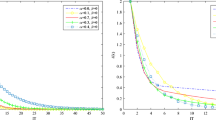Abstract
The local averaging technique has become a popular tool in adaptive finite element methods for solving partial differential boundary value problems since it provides efficient a posteriori error estimates by a simple postprocessing. In this paper, the technique is introduced to solve a class of symmetric eigenvalue problems. Its efficiency and reliability are proved by both the theory and numerical experiments structured meshes as well as irregular meshes.
Similar content being viewed by others
References
R.A. Adams, Sobolev Spaces (Academic Press, New York, 1975).
M. Ainsworth and J.T. Oden, A Posterior Error Estimation in Finite Element Analysis (Wiley Interscience, New York, 2000).
D.N. Arnold, A. Mukherjee and L. Pouly, Locally adapted tetrahedral meshes using bisection, SIAM J. Sci. Comput. 22 (2000) 431–448.
I. Babuska, B.Q. Guo and J.E. Osborn, Regularity and numerical solution of eigenvalue problems with piecewise analytic data, SIAM J. Numer. Anal. 26 (1989) 1534–1560.
I. Babuska and J.E. Osborn, Finite element-Galerkin approximation for the eigenvalues and eigenvectors of selfadjoint problems, Math. Comp. 52 (1989) 275–297.
I. Babuska and J.E. Osborn, Eigenvalue Problems, Handbook of Numerical Analysis, Vol. II, Finite Element Methods (Part I), eds. P.G. Ciarlet and J.L. Lions (North-Holland, Amsterdam, 1991) pp. 641–792.
I. Babuska, T. Strouboulis, C.S. Upadhyay, S.K. Gangaraj and K. Copps, Validation of a posteriori error estimators by numerical approach, Int. J. Numer. Meth. Engrg. 37 (1994) 1073–1123.
R. Becker and R. Rannacher, An optimal control approach to a posteriori error estimation in finite element methods, Acta Numerica 10 (2001) 1–102.
C. Bernardi and R. Verfürth, Adaptive finite element methods for elliptic equations with non-smooth coefficients, Numer. Math. 85 (2000) 579–608.
J.H. Bramble and J.E. Osborn, Rate of convergence estimates for nonselfadjoint eigenvalue approximations, Math. Comp. 27 (1973) 525–549.
C. Carstensen, Quasi-interpolation and a posteriori analysis in finite element methods, RAIRO M2AN 33 (1999) 1187–1202.
C. Carstensen, S. Bartels and R. Klose, An experimental survey of a posteriori Courant finite element error control for the Poisson equation, Adv. Comput. Math. 15 (2001) 79–106.
F. Chatelin, Spectral Approximations of Linear Operators (Academic Press, New York, 1983).
C.M. Chen, Optimal points of stresses for tetrahedron linear element, Natur. Sci. J. Xiangtan Univ. 3 (1980) 16–24 (in Chinese).
Z. Chen and S. Dai, On the efficiency of adaptive finite element methods for elliptic problems with discontinuous coefficients, SIAM J. Sci. Comput. 24 (2002) 443–462.
P.G. Ciarlet, The Finite Element Method for Elliptic Problems (North-Holland, Amsterdam, 1978).
P. Clément, Approximation by finite element functions using local regularization, RAIRO Anal. Numér. 9 (1975) 77–84.
G. Goodsell, Pointwise superconvergence of the gradient for the linear tetrahedral element, Numer. Methods Partial Differential Equations 10 (1994) 651–666.
V. Heuveline and R. Rannacher, A posteriori error control for finite element approximations of elliptic eigenvalue problems, Adv. Comput. Math. 15 (2001) 107–138.
M. Krizek, P. Neitaanmaki and R. Stenberg, Finite Element Methods: Superconvergence, Post-processing, and A Posteriori Estimates, Lectures Notes in Pure Appl. Math., Vol. 196 (Marcel Dekker, New York, 1998).
M.G. Larson, A posteriori and a priori error analysis for finite element approximations of self-adjoint elliptic eigenvalue problems, SIAM J. Numer. Anal. 38 (2000) 608–625.
B. Li and Z. Zhang, Analysis of a class of superconvergence patch recovery techniques for linear and bilinear finite elements, Numer. Methods Partial Differential Equations 15 (1999) 151–167.
Q. Lin and A. Zhou, Notes on superconvergence and its related topics, J. Comput. Math. 11 (1993) 211–214.
R. Rodriguez, Some remarks on Zienkiewicz–Zhu estimator, Int. J. Numer. Meth. PDE 10 (1994) 625–635.
R. Verfürth, A Riview of a Posteriori Error Estimates and Adaptive Mesh-Refinement Techniques (Wiley-Teubner, New York, 1996).
R. Verfürth, A posteriori error estimators for convection-diffusion equations, Numer. Math. 80 (1998) 641–663.
M.F. Wheeler and J.R. Whiteman, Superconvergence recovery of gradients on subdomains from piecewise linear finite element approximations, Numer. Methods Partial Differential Equations 3 (1987) 65–82.
J. Xu and A. Zhou, Local and parallel finite element algorithms based on two-grid discretizations, Math. Comp. 69 (2000) 881–909.
J. Xu and A. Zhou, Local and parallel finite element algorithms based on two-grid discretizations for nonlinear problems, Adv. Comput. Math. 14 (2001) 293–327.
J. Xu and A. Zhou, A two-grid discretization scheme for eigenvalue problems, Math. Comp. 70 (2001) 17–25.
N. Yan and A. Zhou, Gradient recovery type a posteriori error estimates for finite element approximations on irregular meshes, Comput. Methods Appl. Mech. Engrg. 190 (2001) 4289–4299.
Z. Zhang, A posteriori error estimates on irregular grids based on gradient recovery, Adv. Comput. Math. 15 (2001) 363–374.
Z. Zhang and H.D. Victory Jr., Mathematical analysis of Zienkiewicz–Zhu's derivative patch recovery technique, Numer. Methods Partial Differential Equations 12 (1996) 507–524.
Z. Zhang and J.Z. Zhu, Analysis of the superconvergent patch recovery technique and a posteriori error estimator in the finite element method (I), Comput. Methods Appl. Mech. Engrg. 123 (1995) 173–187.
Q. Zhu and Q. Lin, Superconvergence Theory of Finite Element Methods (Hunan Science Press, Changsha, 1989) (in Chinese).
O.C. Zienkiewicz and J.Z. Zhu, The superconvergence patch recovery and a posteriori error estimates, Int. J. Numer. Methods Engrg. 33 (1992) 1331–1364.
Author information
Authors and Affiliations
Additional information
Communicated by Yueshong Xu
Dedicated to Charles A. Micchelli on his 60th birthday
Mathematics subject classifications (2000)
65N15, 65N25, 65N30, 65N50.
Subsidized by the Special Funds for Major State Basic Research Projects, and also supported in part by the Chinese National Natural Science Foundation and the Knowledge Innovation Program of the Chinese Academy of Sciences.
Rights and permissions
About this article
Cite this article
Mao, D., Shen, L. & Zhou, A. Adaptive finite element algorithms for eigenvalue problems based on local averaging type a posteriori error estimates. Adv Comput Math 25, 135–160 (2006). https://doi.org/10.1007/s10444-004-7617-0
Received:
Accepted:
Issue Date:
DOI: https://doi.org/10.1007/s10444-004-7617-0




